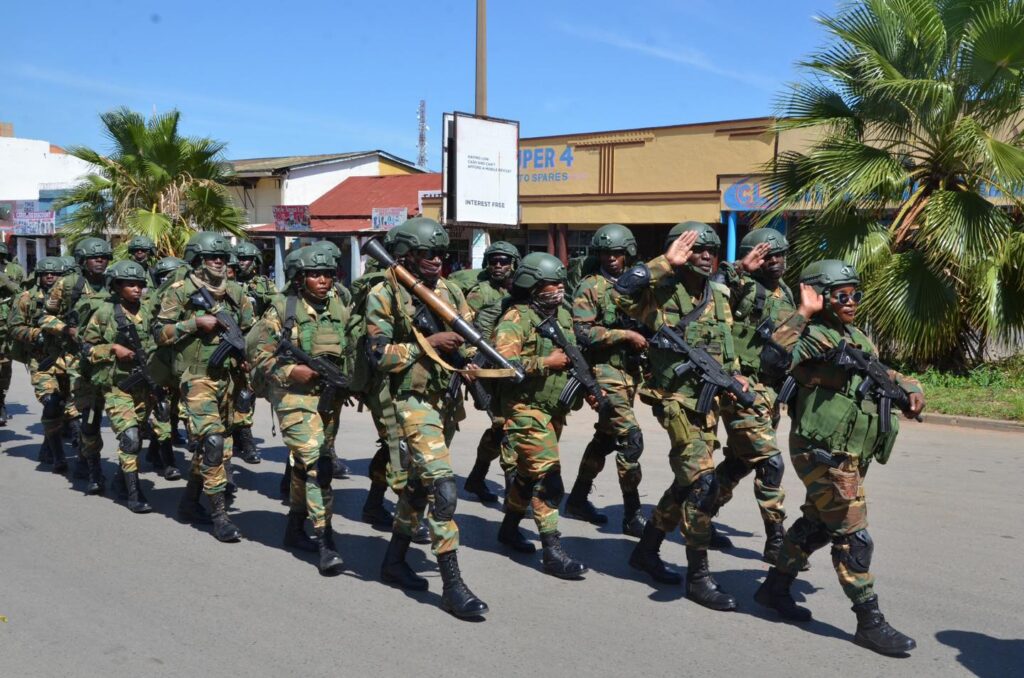ADF STAFF
The Zambia Army has set out to transform itself with a new focus on a civil-military concept and initiatives to professionalize its noncommissioned officers (NCOs), develop enlisted forces and improve public relations with Zambian society.
Staff Sgt. Betty Kaluwa, a communications and protocol specialist in the Zambia Army’s Public Relations and Foreign Liaison Directorate, called the effort “a monumental paradigm shift” and referred to the guiding principle of a “People’s Army.”
“The transformation of the Zambia Army into a People’s Army signifies a comprehensive evolution encompassing transparency, public engagement, commitment to fulfilling constitutional duties and responsible communication in the interest of national security,” she wrote in an article published in the Zambia Daily Mail newspaper on November 11.
The Army says its mission is to protect the nation, prevent conflict, handle disasters, and train and prepare for the future.
Kaluwa described some of the new initiatives:
- Engaging the public with transparent, systematic communication on diverse media platforms: “The departure from the traditionally veiled nature of military operations towards openness is a significant step,” she wrote.
- Supporting Zambia’s Constitution and aligning with democratic principles: “It ensures that the military functions as a protective entity under the oversight of civilians, thereby reinforcing the armed force’s accountability.”
- Balancing transparency with safeguarding classified information crucial for national security: “This balance isn’t just essential; it’s the bedrock of responsible military operations.”
- Highlighting dedication, professionalism and diplomacy: “It’s about redefining the very essence of military service … showcasing soldiers not just as protectors but as ambassadors of the nation.”
- Contributing to United Nations and African Union peacekeeping missions in conflict zones worldwide: This exemplifies “the Army’s broader dedication to global peace and stability.”
Retired Col. Hamwwinde Munamunungu has had a front-row seat for the evolution of the Zambia Army from its fledgling days of expatriate command in the 1960s to the present, which has given him “great pride to have been part of its growth and modernization.”
He credits Gen. Kingsley Chinkuli with the foresight to quickly establish a blueprint for the military after he became the first Indigenous commander of the Zambia Army in 1970.
“I have seen it all,” Munamunungu wrote in a series of historical recollections posted on the Army’s website. “There were no infantry brigades, no artillery regiments, no armored regiments, no engineering regiments, no intelligence and security directorate, no research and development and no ordinance battalions. No this and no that.
“It was literally starting from the beginning of everything an army should be.”
Those deliberate efforts by the Army to transform itself continue under the leadership of Lt. Gen. Dennis Alibuzwi, who joined the Zambia Army in August 1983 and was appointed commander in August 2021.
His stated vision is “to transform the Army into a highly professional force through responsive training, modernization and improvement of welfare of Officers and Soldiers.”
A spokesperson said Alibuzwi seeks to have “a professional and efficient Army that meets the aspirations of the people of Zambia by the year 2025.”
Kaluwa believes that consolidating the military-civilian relationship and fostering the spirit of a People’s Army fits within Alibuzwi’s Vision 2025.
“This transformation underscores the military’s unwavering dedication to accountability and connection with the people they serve, reflecting a mutual commitment to the security and prosperity of the nation,” she wrote.
“This journey not only redefines the military but also redefines the very essence of national security within a democratic framework, setting a powerful precedent for nations worldwide.”

